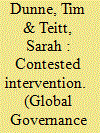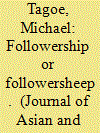| Srl | Item |
| 1 |
ID:
140415


|
|
|
|
|
| Summary/Abstract |
This article examines institutional patterns of leadership and followership in the UN Security Council with respect to the Responsibility to Protect principle. In a departure from existing literature on leadership and followership in international relations, which has hitherto been framed within a realist analysis, the article presents a constructivist account of leadership that sheds light on the strategies and scope of conditions for mobilizing international action to protect populations from mass atrocities. The article applies a theoretical innovation to case studies that examine strategies that India and China adopted in the Security Council to respond to the crises in Libya and Syria from 2011 to 2013. This integration of theory and empirics reveals a complex and layered account of factors that shape the Security Council's ability to exercise its Responsibility to Protect. In doing so, the article demonstrates that followership and leadership are relational practices that create or limit the possibilities for institutional action.
|
|
|
|
|
|
|
|
|
|
|
|
|
|
|
|
| 2 |
ID:
151525


|
|
|
|
|
| Summary/Abstract |
Since the end of the Cold War, Italy has taken part in several multilateral military operations. Many, if not all of them, have implied significant political and human costs for the country. Indeed, the very same contribution to multinational missions in terms of troops deployed bears witness of the importance the country attaches to multilateral missions. In particular, Italy displayed considerable commitment to R2P-inspired interventions. The aim of the paper is then to investigate on the deep causes that drive such an apparently value-oriented foreign policy course. In doing so, it firstly analyses the Italian contribution to multilateral missions. Secondly, the paper discusses which factors can explain such behaviour: international norms, economic and/or security interests, and followership. The paper presents a preliminary test of the drivers of the Italian engagement in multilateral military operations. In this view, it investigates empirically the public debate on Italian participation to relevant R2P-like operations like Kosovo and Libya.
|
|
|
|
|
|
|
|
|
|
|
|
|
|
|
|
| 3 |
ID:
102756


|
|
|
|
|
| Publication |
2011.
|
| Summary/Abstract |
The recent interest in transformational leaders is based on the fact that this type of leadership is change-oriented and focuses on followership development. In Ghana, a long history of failed development strategies and different political leadership styles has left the citizens disappointed in their leaders. This paper argues that Ghana needs transformational leaders who will be able to raise the quality of life of its citizens. Political leaders need to structurally transform the economic base, deal with corruption, and accelerate the pace of empowerment of ordinary Ghanaians through an effective decentralization programme.
|
|
|
|
|
|
|
|
|
|
|
|
|
|
|
|
| 4 |
ID:
097732


|
|
|
|
|
| Publication |
2010.
|
| Summary/Abstract |
Emerging powers such as Brazil and Germany increasingly articulate their desire for leadership in global governance. Examples comprise the bids for permanent membership in the UN Security Council and the founding of the G20 at the WTO meeting in Cancùn. Emerging powers, however, often fail to achieve their goals. This article focuses on followership as a core condition for success and failure of emerging power leadership in global governance. I argue that in order to perform successfully, any leadership must be accepted by followers and that followership depends on the credible inclusion of the interests and/or ideas of potential followers into the leadership project. This argument is tested in case studies on Brazil's and Germany's bids for structural power in the UNSC, for directorship in international organizations and for policy positions in the WTO trade negotiations.
|
|
|
|
|
|
|
|
|
|
|
|
|
|
|
|